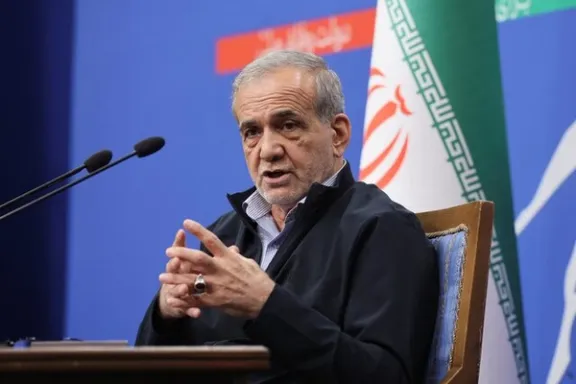Iran’s president moots slashing budget for lackluster agencies

Iranian President Masoud Pezeshkian on Thursday criticized the lack of a merit-based system in public management and threatened to cut the budgets of underperforming government bodies.

Iranian President Masoud Pezeshkian on Thursday criticized the lack of a merit-based system in public management and threatened to cut the budgets of underperforming government bodies.
His comments appeared aimed at addressing widespread frustration with rising costs of living and other woes set to deepen if European powers succeed in triggering international sanctions on Iran due at the end of the month.
Speaking at a meeting with the board of Iran’s Academy of Medical Sciences, Pezeshkian raised concerns over the management of resources in healthcare and other public services.
“Why should the country’s resources be handed over without reason to institutions and bodies that have no benefit or usefulness? If we correct this situation, we will have no problem in securing resources,” state media cited Pezeshkian as saying.
Pezeshkian, a cardiac surgeon by profession, argued that a merit-based system should be introduced in governance, adding that bureaucrats in the capital should not get complacent.
“Many protests stem from the fact that individuals and groups have not received their fair share, and parts of society feel their rights have not been fulfilled. Meanwhile, a few in the capital, imagining themselves to be all-knowing, make decisions for everyone,” he said.
“If appointments were made on the basis of merit and justice, all people would step forward with a sense of responsibility,” he added.
Iran is currently grappling with energy shortages, struggling to provide water and electricity nationwide.
A recent study of hospital managers, conducted this year, highlighted structural problems in public sector management that may reflect broader governance issues.
“Managers at senior, mid-level, and frontline levels lack adequate training in core management competencies, such as strategic planning, resource management, and leadership skills,” the study found.
Using the Management Competency Assessment Partnership (MCAP) tool, the survey covered managers at 162 public hospitals across 19 provinces.
While focused on healthcare, the findings point to systemic shortcomings across the public sector, including outdated recruitment practices and limited investment in professional management training.
“When an organization produces no output, why should it receive money from the taxpayers and treasury? The people should not have to pay the price for the incompetence of managers,” Pezeshkian said.
“One of our problems is that we view everything politically and, instead of solving issues, everyone seeks to change people,” he added.
Iran ranks among the most corrupt countries globally, scoring 23 out of 100 and placing 151st of 180 countries in the 2024 Corruption Perceptions Index (CPI) by Transparency International.
Former Iranian president Hassan Rouhani on Wednesday called for the exit of intelligence and security forces from the economy on Wednesday in a rare sweeping call for reform by a former key player in Tehran's political and security establishment.